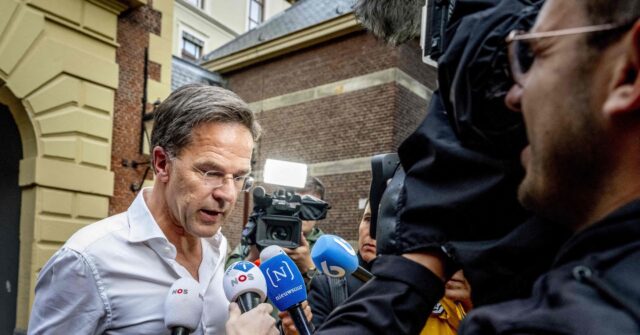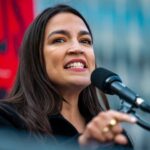

The globalist coalition government in The Netherlands collapsed on Friday evening, with Dutch Prime Minister Mark Rutte tendering his resignation to King Willem-Alexander on Saturday, paving the way for elections to be held by November and the possibility of the populist pro-farmer BBB party to come into power.
The fourth government of Mark Rutte, 56, the Netherlands’ longest-serving prime minister, collapsed on Friday evening as coalition partners were seemingly incapable of coming to a compromise on the issue of migration and asylum policy. This marks the third time since coming to power in 2010 that a Rutte government failed to complete a full term in office.
The alleged dispute that forced the cabinet to collapse came over calls from Rutte’s neo-liberal People’s Party for Freedom and Democracy (VVD) and the Christian Democratic Appeal (CDA) to cut migration and increase restrictions on family reunification of asylum seekers in The Netherlands, a move that the more pro-mass migration coalition partner D66 and ChristenUnie parties could not accept.
The shock collapse of the government forced King Willem-Alexander to return to cut his vacation short and return to his country on Saturday to accept the resignation of Prime Minister Rutte, broadcaster NOS reports.
The collapse of the government comes as asylum applications to the country increased by a third in 2022 to 46,000 and projections expect over 70,000 more to come this year, the most since the 2015 European Migrant Crisis under a previous Rutte government.
The issue of mass migration has come to the fore of Dutch politics as the country’s infrastructure was stretched so thin that last year many migrants were forced to sleep outdoors as a result of lack of accommodation, as has been seen in many other European countries in recent years.
Dutch PM Vows to ‘Accelerate’ EU Green Agenda Despite Pro-Farmer Party Victory https://t.co/P1deEqkzwK
— Breitbart London (@BreitbartLondon) April 7, 2023
While Rutte appeared to try to take a harder line on migration in negotiations with his cabinet, some have questioned whether this was merely a political calculation to put himself in a position of strength in a fresh round of elections, which many have speculated would occur this year following the stunning regional elections that saw the insurgent populist Farmer-Citizen Movement (BBB) become the largest party in the Senate and throughout regional governments earlier this year.
Responding to the collapse of the Rutte government, Dutch political commentator Eva Vlaardingerbroek said: “I think the actual fall of the cabinet itself is all for show. The ‘disagreement’ about immigration that they’re mentioning as the deciding factor, is not the real issue, because all government parties are in favour of more mass migration, including Mark Rutte’s VVD.
“Rutte just seems to think that he can trick the Dutch people into believing that he actually wants a stricter immigration policy this time around, and he thinks he can get re-elected again if he makes these false new promises.
“Do not fall for it. We cannot let him win again.”
Vlaardingerbroek, who has been a champion of the Dutch farmer protest movement that saw thousands of farmers take to their tractors over the past two years in opposition to the EU-driven green agenda that threatens to shut down their farms forever, said, however, that the upcoming elections represent a “real chance of getting our country back” and to fight back against the “expropriation of our farmers, push back on immigration, and take back our national sovereignty from organisations like the EU and the WEF.”
“Let’s pray that enough people have woken up and will actually vote for change this time. We will not get a second chance,” she said.
Dutch Farmers: Netherlands a ‘Pilot Country’ for Great Reset Agenda, Eva Vlaardingerbroek Tells Breitbart https://t.co/HP6RqbM8PV
— Breitbart London (@BreitbartLondon) July 16, 2022
Meanwhile, the leader of the populist Farmer-Citizen Movement (BoerBurgerBeweging/BBB) party, Caroline Van der Plas said in the wake of the collapse of the cabinet that she has not ruled out the idea of becoming the country’s next prime minister, stating bluntly: “If it comes to it, it comes to it.”
The insurgent anti-Great Reset party, which was only formed in 2019, swept to a stunning victory in the regional elections in March, becoming the largest party in all provincial governments as well as the Dutch Senate.
Although Rutte was able to cobble together enough support to maintain his coalition government, cracks soon began to emerge following the regional elections, throwing in doubt Rutte’s ability to force the EU-demanded restrictions on farmer nitrogen emissions and the closure of thousands of farms.
Shortly after her party’s shock success at the ballot box, Van der Plas correctly predicted that the results would ultimately force the government to hold elections sometime this year.
On Saturday, the populist leader shared a video on Twitter, writing: “The campaign has started! Our voters hang BBB flags everywhere and the [Nethrelands] flag is straight again,” in reference to the tactic deployed by farmers over the past year of turning the Dutch flag upside down in protest against the government’s anti-farmer agenda.
De campagne is begonnen! Onze kiezers hangen overal BBB-vlaggen op en de NL vlag weer recht. Kreeg dit filmpje zojuist… Boeren zijn daar druk geweest #nieuweverkiezingen 🙏💚 pic.twitter.com/h5ImtpCHId
— Caroline van der Plas (@lientje1967) July 7, 2023
For now, the cabinet of Mark Rutte will continue in its role in a limited capacity as a caretaker government until elections can be held. It is projected that the elections will be held sometime in November, until which point the government will only be able to make decisions on pending issues.
However, the House of Representatives has the power to declare some issues as “controversial” and must, therefore, wait to be decided until the next government is put in place.
While no firm decision has been made as of this reporting, Prime Minsiter Rutte has indicated that he intends to stay on as the leader of the People’s Party for Freedom and Democracy (VVD) through the election, meaning that there is a possibility for the globalist leader to maintain his grip on power and continue to impose his anti-farming agenda on the Dutch people.
EU Backs Dutch Scheme to Forcibly Shut Down Thousands of Farms, Ban Farmers From Returning to Agriculture Foreverhttps://t.co/3SePLYsnXU
— Breitbart London (@BreitbartLondon) May 3, 2023




